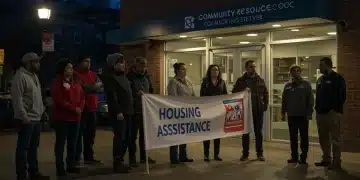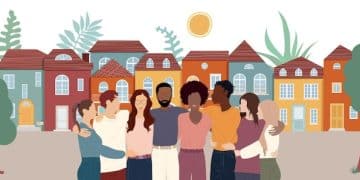Community Resource Centers: Your Guide to Services & Access in the US

Community resource centers offer a wide array of services, including housing assistance, job training, healthcare, and educational programs, providing vital support to individuals and families; accessing these resources typically involves contacting the center directly, attending informational sessions, or utilizing online directories.
Community resource centers: What services are available and how to access them? These centers act as hubs, connecting residents with essential programs and support systems within their local areas; understanding what they offer and how to navigate them can significantly improve your quality of life and empower you to overcome various challenges.
Understanding Community Resource Centers
Community resource centers are vital hubs within a neighborhood, connecting individuals and families with a wide array of support services and programs designed to address various needs; these centers act as a central point of access, making it easier for residents to find and utilize the resources available in their community.
Think of them as one-stop shops where you can find assistance with everything from job training and housing to healthcare and educational programs; they typically partner with local organizations, government agencies, and non-profits to offer a comprehensive suite of services all under one roof.

Benefits of Using Community Resource Centers
Utilizing a community resource center brings numerous advantages by offering a convenient and streamlined way to access vital services and support systems; these benefits extend beyond simple access, providing multifaceted improvements to community members’ lives.
- Simplified Access: Instead of navigating multiple agencies or organizations, you can find a variety of services in one location.
- Personalized Assistance: Staff members often provide one-on-one guidance, helping you identify the resources that best meet your needs.
- Community Connection: Centers serve as gathering places, fostering a sense of belonging and offering opportunities to connect with others.
- Comprehensive Support: Many centers offer a range of services, addressing multiple needs and promoting holistic well-being.
In essence, community resource centers are designed to streamline the process of finding help, ensuring that individuals and families can efficiently access the support they need to thrive; the integrated approach minimizes confusion and maximizes the impact, leading to better outcomes and stronger communities.
Key Services Offered at Community Resource Centers
Community resource centers offer a wide variety of services tailored to meet the diverse needs of the communities they serve; these services often fall into several key categories, providing comprehensive support for individuals and families.
From essential needs like food and housing to opportunities for personal and professional development, these centers strive to address the holistic well-being of their community members; here are some of the most common and impactful services they provide.
Essential Needs Assistance
Many centers offer programs to help individuals and families meet their basic needs, such as food, shelter, and clothing; assistance with these fundamental requirements is crucial for stability and overall well-being.
- Food Banks/Pantries: Providing free groceries and meals to those experiencing food insecurity.
- Emergency Shelter: Offering temporary housing for individuals and families facing homelessness.
- Clothing Assistance: Distributing donated clothing to those in need, ensuring they have appropriate attire for work, school, and daily life.
Job Training and Employment Services
Empowering community members with the skills and resources they need to find meaningful employment is another core function; these programs aim to reduce unemployment and improve economic stability.
Several centers offer workshops on resume writing, interview skills, and job searching strategies; they also provide access to computers, internet and other resources necessary in today’s digital age.

Health and Wellness Programs
Promoting physical and mental well-being is essential for a thriving community, and many centers offer a range of health-related services and programs; these initiatives often focus on prevention, education, and access to care.
- Health Screenings: Offering free or low-cost screenings for common health conditions like blood pressure, diabetes, and cholesterol.
- Mental Health Services: Providing counseling, therapy, and support groups to address mental health concerns.
- Fitness Programs: Offering exercise classes, sports leagues, and other activities to promote physical activity and healthy lifestyles.
- Nutrition Education: Teaching individuals and families about healthy eating habits and meal planning.
Ultimately, community resource centers play a critical role in enhancing the quality of life for individuals and families by providing a wide range of services that address basic needs, promote economic stability, and support health and wellness; these services are essential for building stronger, more resilient communities.
How to Find a Community Resource Center Near You
Locating a community resource center in your vicinity is a straightforward process with several options available; knowing where to look can make accessing these vital services much easier and more efficient.
With a few simple strategies, you can identify the centers closest to you and start exploring the resources they offer; here are some effective ways to find a community resource center near you.
Online Directories and Search Engines
The internet is a powerful tool for locating resources in your area; several online directories and search engines specialize in connecting people with community services.
Start by using search engines like Google, Bing, or DuckDuckGo and enter search terms such as “community resource center near me” or “social services in [your city/county]”; these searches will often yield results from local government websites, non-profit directories, and individual center listings.
- 211 Helpline: Dial 2-1-1 to connect with a local resource specialist who can provide information on community services in your area.
- United Way: Visit the United Way website and search for community resources based on your location and needs.
- Local Government Websites: Check the websites of your city, county, or state government for directories of local services.
Community Outreach and Networking
Another effective way to find community resource centers is by engaging with local organizations and community leaders; they often have valuable insights and connections to resources you may not find online.
Attend community events, meetings, and workshops to network with people who are familiar with local services; these gatherings are great opportunities to learn about centers and connect with people who can guide you.
- Local Libraries: Libraries are often community hubs and can provide information on local resources and programs.
- Schools: Schools may have connections to community resource centers and can offer referrals to families in need.
- Faith-Based Organizations: Churches, synagogues, mosques, and other religious institutions often partner with community resource centers and can provide assistance.
By combining online research with community engagement, you can effectively locate community resource centers near you and access the support services they offer; this dual approach ensures you have a comprehensive understanding of the resources available in your area, empowering you to make informed decisions and seek the help you need.
Preparing to Visit a Community Resource Center
Before visiting a community resource center, careful preparation can significantly enhance your experience and ensure you get the most out of their services; knowing what to expect and having the necessary information on hand can streamline the process and help you access the support you need efficiently.
From gathering essential documents to understanding the intake process, being well-prepared will make your visit productive and less stressful; here’s what you should consider before heading to a community resource center.
Gather Necessary Documents
Collecting the appropriate documents beforehand can save time and ensure you’re able to access the services you need without delay; the specific documents required will vary depending on the services you are seeking, but some common items include:
- Identification: Bring a valid photo ID, such as a driver’s license, passport, or state-issued identification card.
- Proof of Address: Provide documentation that verifies your current address, such as a utility bill, lease agreement, or official letter.
- Income Verification: Have documents that prove your income, such as pay stubs, tax returns, or social security statements.
- Medical Records: If you’re seeking healthcare services, bring any relevant medical records or insurance information.
Understand the Intake Process
Familiarizing yourself with the intake process will help you navigate your visit more smoothly and efficiently; the intake process typically involves several steps designed to assess your needs and connect you with the appropriate services.
- Initial Assessment: Be prepared to answer questions about your current situation, needs, and goals during the initial assessment.
- Eligibility Determination: Understand that some services may have specific eligibility requirements based on income, residency, or other factors.
- Program Enrollment: If you’re eligible for a particular program, you may need to complete an enrollment form and provide additional documentation.
By gathering the necessary documents and understanding the intake process, you can approach your visit to a community resource center with confidence and efficiency; this preparation ensures that you’re well-equipped to access the services you need and receive the support that will benefit you the most.
Overcoming Barriers to Accessing Community Resources
Accessing community resources can be a game-changer for individuals and families facing challenges, but various barriers can hinder their ability to utilize these services effectively; understanding these obstacles is the first step in finding solutions.
By recognizing these barriers and implementing strategies to overcome them, community members can ensure they have access to the resources they need to thrive; here are some common barriers and how to address them.
Transportation Issues
Lack of reliable transportation is a significant barrier for many people, particularly in rural or underserved areas; without a way to get to the center, accessing services becomes nearly impossible.
Explore public transportation options, such as buses, trains, and subways, in your area and plan your route ahead of time; look for centers that are located on public transportation lines or offer transportation assistance.
- Carpooling: Coordinate with friends, neighbors, or community members to share rides to the center.
- Volunteer Transportation Services: Some organizations offer volunteer-based transportation to help individuals access essential services.
Language and Cultural Obstacles
Language barriers can make it difficult for individuals to understand available services and communicate their needs effectively; cultural differences may also create misunderstandings or discomfort.
Seek out centers that offer services in multiple languages or provide interpreters to assist non-English speakers; learn about the cultural norms and expectations of the center and its staff to avoid misunderstandings.
- Bilingual Staff: Look for centers that employ bilingual staff members who can help bridge communication gaps.
- Cultural Sensitivity Training: Support centers that provide cultural sensitivity training to their staff to ensure respectful and inclusive service delivery.
By actively addressing these barriers, communities can ensure that all individuals have equal access to the resources they need to thrive; overcoming these obstacles leads to stronger, more resilient communities where everyone has the opportunity to succeed.
Advocating for Community Resource Centers
Advocating for community resource centers is vital to expanding their impact and ensuring they continue to meet the evolving needs of the communities they serve; these centers rely on ongoing support from the public and private sectors to sustain and grow their programs.
There are multiple avenues to advocate effectively, ranging from grassroots efforts to policy-level engagement; by taking action, you can amplify the voices of those who rely on these essential services and help secure their future.
Engage with Local Government
Engaging with local government officials is a powerful way to influence policy and funding decisions that affect community resource centers; by building relationships with elected officials and advocating for their support, you can help ensure that these centers receive the resources they need to thrive.
- Attend City Council Meetings: Attend city council meetings to voice your support for community resource centers and advocate for funding and policy changes.
- Write Letters to Elected Officials: Write letters or emails to your elected officials expressing your concerns and urging them to support community resource centers.
- Invite Officials to Visit Centers: Invite elected officials to tour community resource centers and learn firsthand about the services they provide.
Support Fundraising Efforts
Community resource centers often rely on fundraising to supplement government funding and private grants; supporting these fundraising efforts is a direct way to contribute to their financial stability and ensure they can continue to provide essential services.
- Donate to Fundraising Campaigns: Donate to fundraising campaigns organized by community resource centers, whether through online platforms, mail-in donations, or in-person events.
- Participate in Fundraising Events: Participate in fundraising events, such as walks, runs, auctions, and galas, to raise money and awareness for community resource centers.
| Key Aspect | Brief Description |
|---|---|
| 🏠 Accessing Housing | Locate a center and inquire about rent assistance and housing |
| 👨💼 Job Training | Enroll in job training programs to enhance skills and find jobs. |
| ❤️ Health Programs | Find healthcare resources, mental health, nutrition or health screens. |
| 🧑🏫 Educational Programs | They provide guidance on schools and enrollment within that area. |
Frequently Asked Questions
▼
A community resource center is a local hub that provides a variety of support services and programs to individuals and families, offering resources related to housing, employment, healthcare, and education.
▼
Services include food banks, job training, health screenings, mental health services, housing assistance, and educational programs, depending on the needs in that specific community. They are broad and wide-reaching.
▼
You can find a center online through search engines, the United Way website, or the 211 helpline; check local government websites, libraries, and community organizations to identify resources.
▼
Bring a photo ID, proof of address, income verification, and any relevant medical records; the exact requirements will depend on the services you are seeking, so always call ahead to ask.
▼
Conclusion
Community resource centers serve as indispensable hubs, connecting individuals and families with essential services and programs; by understanding what these centers offer and how to access them, communities can empower their residents and improve their overall quality of life.





